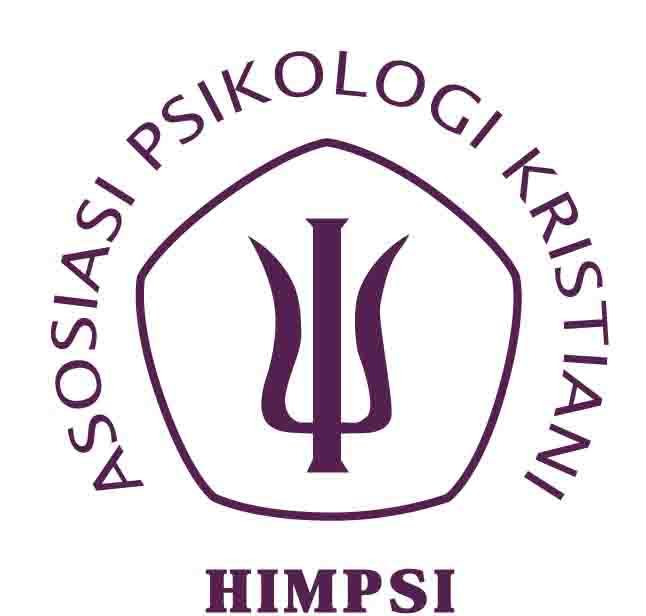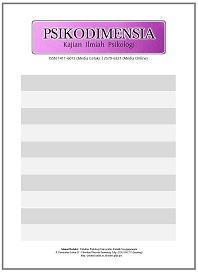KEBERSYUKURAN DAN KEBAHAGIAAN PADA WANITA YANG BERCERAI DI ACEH
Abstract
Keywords
Full Text:
PDFReferences
Anggoro, W. J., & Widhiarso, W. (2010). Konstruksi dan identifikasi propertis instrumen pengukuran kebahagiaan berbasis pendekatan indigenous psychology:studi multitrait-multimethod. Jurnal Psikologi, 37(2), 176-188.
Carr, A. (2011). Positive psychology: The science of happiness and human strengths. New York: Brunner-Routledge.
Dariyo, A. (2004). Memahami psikologi perceraian dalam kehidupan keluarga. Jurnal Psikologi, 2(2), 94-100.
Dewi, N. Y., & Sudhana, H. (2013). Hubungan antara komunikasi interpersonal pasutri dengan keharmonisan dalam pernikahan. Jurnal Psikologi Udayana, 1(1), 22-31.
Emmons, R. A., & McCullough, M. E. (2003). Counting blessings versus burdens: an experimental investigation of gratitude and subjective wellbeing in daily life. Journal of personality and social psychology, 84(2), 377389.
Froh, J.J., Yurkewicz, C., & Kashdan, T.B. (2009) Gratitude and subjective in early adolescence: examining gender differences. Journal Of Adolescence, 32. 633-650.
Hambali, A., Meiza, A., & Fahmi, I. (2015). Faktor-faktor yang berperan dalam kebersyukuran (gratitude) pada orangtua anak berkebutuhan khusus perspektif psikologi Islam. Psympathic, jurnal ilmiah psikologi, 2(1), 94101.
Kristanto, E. (19-20 Februari, 2016). Perbedaan tingkat kebersyukuaran pada lakilaki dan perempuan. Dipresentasikan pada seminar ASEAN 2nd Psychology and Humanity, Malang.
Mahkamah Syar’iyah Aceh. Diakses pada tanggal 24 November 2015, melalui http://www.ms-aceh.go.id.
Markam, H. J., Rhoades, G. K., Stanley, S. M., Ragan, E. P., & Whitton, S. W. (2010). The premarital communication roots of marital distress and divorce: the first years of marriage.J Fam Psychol, 24(3), 289-298.Doi:10.1037/a0019481.
McCullough, M.E., Emmons, R.A., & Tsang, J.A. (2002). The grateful disposition: a conceptual and empirical topography. Journal of personality and social psycology, 82(1), 112-127.
Mubarok, A. (2016). Psikologi keluarga. Jawa Timur: Madani.
Mutia, E., Subandi., & Mulyati, R. (2010). Terapi kognitif perilaku bersyukur untuk menurunkan depresi pada remaja. Jurnal intervensi psikologi, 2(1), 53-68.
Nisfannoor, M., & Yulianti, E. (2005). Perbandingan perilaku agresif antara remaja yang berasal dari keluarga bercerai dengan keluarga utuh. Jurnal Psikologi, 3(1), 1-18.
Nur’aeni, M., & Dwiyanti, R. (2009). Dinamika psikologis perempuan yang bercerai (studi tentang penyebab dan status janda pada kasus perceraian di Purwokerto. Psycho idea, 7(1), 11-21.
Olson, D., DeFrain, J., & Skogrand, L. (2010). Marriages and Families Intimacy, Diversity, and Strengths (7th Edition). Boston: McGraw-Hill.
Papalia, D. E., Olds, S. W., & Feldman, R. D. (2009). Human development (perkembangan manusia), Ed. 10. Penerjemah: Brian Marwensday. Jakarta: Salemba Humanika.
Patnani, M. (2012). Kebahagiaan pada perempuan. Jurnal Psikogenesis, 1(1), 5664.
Priyatno, D. (2011). Buku Saku SPSS; Analisis statistik data, lebih cepat, efesien, dan akurat. Yogyakarta: MediaKom.
Puspitasari, T., & Nasfiannor, M. (2005). Komitmen beragaman dan subjective well-being. Journal Phronesis,7. 73-93.
Putra, J. S. (2014). Syukur: sebuah konsep psikologi indigenous islami. Jurnal Soul, 7(2), 35-44.
Ramzan, N. & Rana, S.A. (2014). Expression of gratitude and subjective well-being among university teachers. Middle-East Journal of Scientific Research, 21(5): 756-762.
Rohma, N. H. (2013). Hubungan antara kepuasan hidup remaja dengan bersyukur pada siswa SMAIT Abu Bakar boarding school Yogyakarta. EmpathyJurnal Fakultas Psikologi, 2(1), 1-16.
Rostiana., & Koesma, R.E. (2009). Kajian awal tentang makna kebahagian: arti ciri dan cara pencapaian kebahagiaan dalam konteks budaya islam dan Kristen di Jakarta. Jurnal Psikologi, 24(2), 24-33.
Sari, K. (2012). Forgiveness pada istri sebagai upaya untuk mengembalikan keutuhan rumah tangga akibat perselingkuhan. Jurnal Psikologi Undip, 11(1), 50-58.
Seligman, M. E. P. (2002). Authentic happiness: using the new positive psychology to realize your potential for lasting fulfillment. New York: The Free Press.
DOI: https://doi.org/10.24167/psiko.v16i2.1269
Print ISSN : 1411-6073 | online ISSN : 2579-6321 View My Stats

This work is licensed under a Creative Commons Attribution 4.0 International License.




















